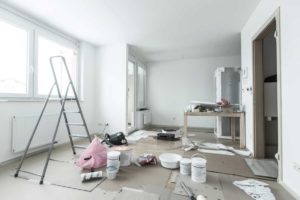This QLD article is about body corporate requirements when renovating your apartment.
 If you’re thinking of renovating your unit, good on you. There’s nothing like a makeover to give you a beautiful home to relax in and can often increase the value – if done tastefully, and meets all regulations and codes.
If you’re thinking of renovating your unit, good on you. There’s nothing like a makeover to give you a beautiful home to relax in and can often increase the value – if done tastefully, and meets all regulations and codes.
But bear in mind, that even though you own the Unit, there are things you need to check thoroughly and processes you need to follow to ensure you don’t compromise the structural integrity, contravene any of your Scheme’s By-Laws, or undertake unauthorised work.
There are many restrictions in place when it comes to apartment renovations so you need to understand what you can and can’t do. Legally, if you don’t abide by the restrictions and decisions, you could be made to restore everything to how it was. And if during the process, you or your trade contractors damage any common property areas, you will be up for the repair bill.
Check Common Property Areas
The first thing to check thoroughly is whether any of the areas you are planning to renovate are classified as common property. You will need solid advice on where your lot property ends and where common property begins. Often kitchens, bathrooms and laundries are located on external walls, which means they’re adjoining common property and you will need to get permission from your Body Corporate Committee before commencing any work. Particularly in the case of bathrooms where work may affect the waterproof membrane.
Check Structural Walls
If your lot is on the lower levels of a multi-storey building, the chances of being able to remove internal walls are nearly zilch. Most of the internal walls in an apartment are load-bearing, so if you take out a wall it can cause structural damage and cracking in the apartments above.
Review ByLaws
Many schemes have specific bylaws about what cannot be done to external-facing areas, which may surprise you! There may be limitations on:
- Uniformity of curtains and blinds and shutters
- The amount (and type) of items you can have on a balcony
- Installing an air conditioner
Sometimes there are also restrictions on what you can do internally – for example, some Schemes have rules around hard floors due to possible noise transference to adjoining apartments. Most by-laws we’ve seen relating to this specify mention that owners need to ensure that acoustic sound proofing (that meets the Australian Standard) is installed first.
Get Permission
The best thing to do is to notify your Body Corporate Manager first of the scope of works for your renovation.
Most renovation work will cause disruption to residents, so it really is in your best interests to have your body corporate on side, as well as your nearby neighbours. Your trades people will need parking and access, rubbish will need to be removed, there may be noise from power tools, smells from paints and glues etc – and all of these will impact residents’ rights to live in a peaceful, quiet community.
It’s far easier to gain permission and co-operation up front than it is to be forgiven afterwards.
Embed
This post appears in Strata News #278
Read next:
- QLD: Q&A Boundary and Common Property Issues
- NAT: Apartment Block Residents Stressed by Fan Noise [Case Study]
- Improving common property and lots
Tower Body Corporate
E: [email protected]
P: 07 5609 4924
This article is not intended to be personal advice and you should not rely on it as a substitute for any form of advice.
This media release first appeared on the Tower Body Corporate’s website.
Visit Maintenance and Common Property OR Strata Legislation QLD
After a free PDF of this article? Log into your existing LookUpStrata Account to download the printable file. Not a member? Simple – join for free on our Registration page.
Have a question or something to add to the article? Leave a comment below.



Leave a Reply